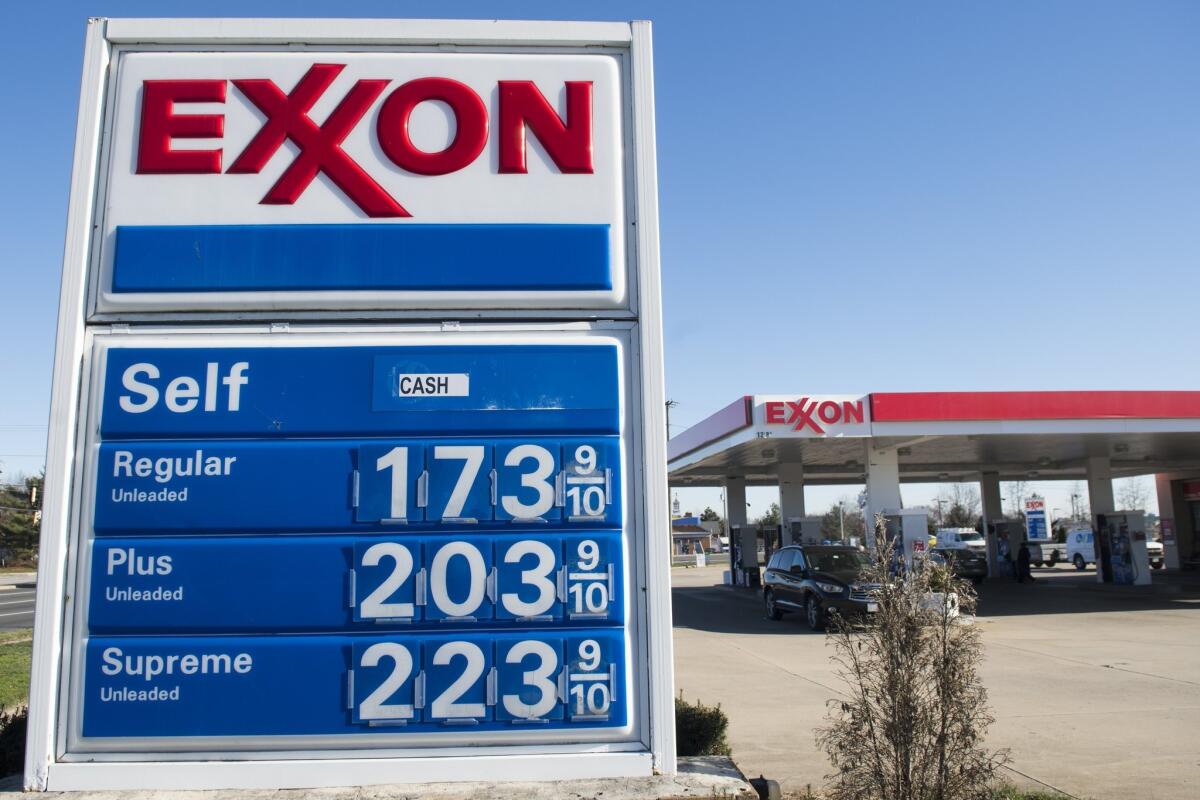Op-Ed: A Rockefeller explains: Why I lost faith in Exxon Mobil, and donated my shares

Gas prices are displayed at an Exxon gas station in Woodbridge, Va. on Jan. 5.
- Share via
My great-grandfather, John D. Rockefeller Sr., created the Standard Oil Company and I inherited shares in the companies it spun off, including Exxon Mobil. But this year I donated those shares to the nonprofit Rockefeller Family Fund’s Environmental program, which sold them and is using the $400,000 proceeds to fight global warming.
I lost faith in Exxon Mobil’s future value. A prime reason is that Exxon’s valuation is based largely on the immense untapped reserves of oil and gas it owns. And yet if future generations are to inherit a livable world, most of those reserves must stay in the ground.
After it was revealed that tobacco companies knew smoking caused cancer even as they funded hack scientists to deny it, they had to pay billions in fines and damages.
Cynics may say that foreknowledge of the dire consequences won’t stop humanity from using this fossil fuel. I would answer that Exxon Mobil may not have any choice in the matter. The company bases its growth and stability projections on increasing its sale of fossil fuels to developing countries. And yet those are the places that will be hurt first and worst by climate change — indeed, many are already suffering the effects. As those nations confront ecological harm and consequent economic damage — in some cases even possible economic collapse — will they really provide Exxon Mobil with the growth it forecasts?
In shareholder resolutions and meetings with company representatives over the last 15 years, I and other members of my family have argued that it is shortsighted for Exxon to insist on remaining “an oil and gas company” — rather than evolving into an energy company prepared to transition to a post-carbon economy. I thought the company was being foolish. But we now know it was worse: it was being deceitful, in a way that is almost unimaginably heartless to future generations.
Reporting by two publications, working independently of each other — InsideClimate News and the Los Angeles Times — has shown that, starting in the late 1970s, Exxon’s scientists were leaders both in understanding the role of carbon emissions in global warming and in projecting its effects. By the mid-1980s, however, the company took a different public stance. It began to finance think tanks and researchers who cast doubt on the reliability of climate science.
Internally, though, the company continued to accept the validity of the science it had helped pioneer. In the midst of its denial campaign, for instance, Exxon projected business opportunities presented by global warming: As polar sea ice melted, there would be new possibilities for oil drilling in the Arctic. At the same time, Exxon scientists warned the company of more dire climate change implications — for the planet and corporate revenue. These findings were given to the company’s management, but not released to shareholders or to securities regulators.
Way back in 1982 Exxon Mobil’s environmental affairs office printed a primer on climate change marked “not to be distributed externally.” It laid out for company leaders the reality that major reductions in fossil fuel combustion would be required to avert “potentially catastrophic events.” Since then globally catastrophic events have become virtually certain. We already feel the oncoming wave in storms, flooding, droughts, hunger, human immiseration and migration. How different things might be if Exxon and others had begun to pivot away from fossil fuels 34 years ago.
As the enormity of the effects of its lies becomes more evident, Exxon Mobil is positioned to supplant Big Tobacco as global Public Enemy No. 1. This is not good for a company’s bottom line. The attorneys general in New York and California have launched investigations into whether Exxon defrauded its shareholders by hiding what it knew about climate change.
Such investigations, with their legal power of discovery, are likely to unearth even more about what the company knew and when it knew it. That, in turn, likely will lead to lawsuits. After it was revealed that tobacco companies knew smoking caused cancer even as they funded hack scientists to deny it, they had to pay billions in fines and damages. Exxon could face much worse.
Even before Exxon Mobil feels the loss in spending power among its expected developing country clients, public anger is likely to find other ways to take the company down. Just when Exxon’s stock price will begin to reflect these realities is hard to predict. But I’m glad that the recipients of my Exxon stock sold it immediately.
Neva Rockefeller Goodwin, an economist, is the co-director of the Global Development and Environment Institute at Tufts University.
Follow the Opinion section on Twitter @latimesopinion and Facebook
MORE FROM OPINION
It’s time to give the DWP a reboot
Nominating Supreme Court justices is Obama’s job. Let him do it.
Trump and Sanders are the logical result of government that doesn’t deliver
More to Read
A cure for the common opinion
Get thought-provoking perspectives with our weekly newsletter.
You may occasionally receive promotional content from the Los Angeles Times.










